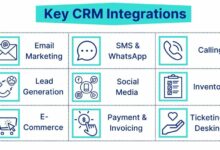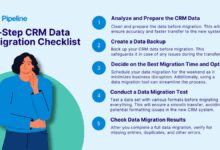Enterprise CRM Implementation Services: 7 Ultimate Power Strategies
Navigating the complex world of enterprise CRM implementation services doesn’t have to be overwhelming. With the right strategy, businesses can unlock powerful customer insights, streamline operations, and drive revenue growth like never before.
Understanding Enterprise CRM Implementation Services

Enterprise CRM implementation services are specialized solutions designed to help large organizations deploy Customer Relationship Management (CRM) systems effectively. These services go beyond basic software installation—they encompass strategy, customization, data migration, integration, training, and ongoing support tailored to the unique needs of enterprise-level businesses.
What Sets Enterprise CRM Apart from SMB Solutions?
Unlike CRM systems built for small and medium-sized businesses (SMBs), enterprise CRM platforms are engineered to handle vast amounts of data, complex workflows, and multi-departmental collaboration across global teams. They offer advanced automation, deep analytics, and scalability that align with the operational scale of large corporations.
- Support for thousands of users across multiple regions
- Advanced security and compliance features (e.g., GDPR, HIPAA)
- Highly customizable interfaces and business logic
- Integration with ERP, marketing automation, and legacy systems
“Enterprise CRM isn’t just a tool—it’s a strategic asset that reshapes how organizations engage with customers at scale.” — Gartner Research, 2023
Core Components of Enterprise CRM Implementation
A successful enterprise CRM implementation involves several interdependent components. Skipping or underestimating any of these can lead to project delays, budget overruns, or user resistance.
- Needs Assessment: Identifying business goals, pain points, and key performance indicators (KPIs).
- Vendor Selection: Choosing between platforms like Salesforce, Microsoft Dynamics 365, Oracle CX, or SAP CRM based on fit and scalability.
- Data Migration: Transferring historical customer data securely while ensuring data integrity.
- System Integration: Connecting CRM with existing tools such as email marketing platforms, call centers, and financial systems.
- User Training & Adoption: Ensuring teams are equipped to use the system efficiently.
According to a McKinsey report, companies that skip proper assessment during CRM implementation face up to 40% lower ROI within the first two years.
Why Enterprise CRM Implementation Services Are Critical
While some organizations attempt DIY CRM rollouts, enterprise-level complexity demands professional implementation services. These services ensure that the CRM system is not only technically sound but also strategically aligned with business objectives.
enterprise crm implementation services – Enterprise crm implementation services menjadi aspek penting yang dibahas di sini.
Reducing Risk and Increasing ROI
Professional enterprise CRM implementation services significantly reduce the risk of project failure. A study by Nucleus Research found that companies using consultants for CRM deployment achieved an average of 2.5x higher return on investment compared to those relying solely on internal teams.
- Experts anticipate integration challenges before they occur
- They optimize workflows to match real-world business processes
- They provide change management frameworks to ease organizational transitions
For example, a global financial services firm reduced onboarding time by 60% after partnering with a certified Salesforce implementation partner who restructured their lead management process during deployment.
Ensuring Scalability and Future-Proofing
One of the biggest advantages of working with enterprise CRM implementation services is future-readiness. These providers design systems that can grow with the business—supporting new product lines, markets, or digital transformation initiatives.
- Modular architecture allows for phased rollouts
- Cloud-native solutions enable rapid scaling during peak demand
- API-first design supports emerging technologies like AI and IoT
As highlighted in a Forrester report, AI-powered CRM systems are expected to drive 30% of all customer interactions by 2026. Implementation partners help enterprises prepare for this shift today.
Top 7 Enterprise CRM Implementation Strategies That Deliver Results
Success in CRM implementation isn’t accidental—it’s the result of deliberate, well-executed strategies. Below are seven proven approaches used by top-performing organizations worldwide.
1. Start with a Clear Business Vision
Before selecting software or migrating data, define what success looks like. Is it faster sales cycles? Improved customer retention? Better cross-sell opportunities?
enterprise crm implementation services – Enterprise crm implementation services menjadi aspek penting yang dibahas di sini.
- Conduct stakeholder interviews across departments
- Map current customer journey touchpoints
- Set measurable KPIs (e.g., 20% increase in lead conversion)
Without a clear vision, even the most advanced CRM system becomes a costly digital filing cabinet.
2. Choose the Right Implementation Partner
Not all CRM consultants are created equal. Look for partners with:
- Proven experience in your industry (e.g., healthcare, finance, manufacturing)
- Certifications from major vendors (Salesforce Platinum Partner, Microsoft Gold Partner)
- A track record of delivering projects on time and within budget
Check client testimonials and case studies. For instance, Salesforce’s Partner Directory allows you to filter by expertise, region, and customer ratings.
3. Adopt a Phased Rollout Approach
Trying to deploy CRM across all departments at once often leads to chaos. A phased rollout minimizes disruption and allows for iterative improvements.
- Phase 1: Sales team pilot (3–6 months)
- Phase 2: Marketing automation integration
- Phase 3: Customer service and support modules
- Phase 4: Executive dashboards and AI analytics
This approach gives teams time to adapt and provides valuable feedback for refining the system before full-scale deployment.
4. Prioritize Data Quality and Governance
Poor data quality is the #1 reason CRM projects fail. Duplicate records, outdated contact info, and inconsistent formatting render analytics useless.
enterprise crm implementation services – Enterprise crm implementation services menjadi aspek penting yang dibahas di sini.
- Implement data cleansing tools before migration
- Establish data ownership policies (who enters, updates, and approves data?)
- Use validation rules and automation to maintain accuracy
“Garbage in, garbage out” applies more to CRM than any other enterprise system.
Companies using data governance frameworks report 45% higher data accuracy post-implementation, according to IBM.
5. Integrate Seamlessly with Existing Systems
Your CRM shouldn’t operate in isolation. It must connect with ERP, HRIS, e-commerce platforms, and communication tools.
- Use middleware like MuleSoft or Dell Boomi for complex integrations
- Leverage pre-built connectors where available
- Test API performance under real-world load conditions
A retail giant increased order fulfillment speed by 35% after integrating their CRM with SAP S/4HANA, enabling real-time inventory visibility for sales reps.
6. Focus on User Adoption and Change Management
Even the best CRM system fails if employees don’t use it. Adoption is not just about training—it’s about culture, incentives, and usability.
- Involve end-users early in the design process
- Provide role-based training (sales vs. support vs. marketing)
- Appoint internal CRM champions in each department
- Link CRM usage to performance metrics and rewards
A telecommunications company improved CRM adoption from 48% to 89% within six months by launching a gamified onboarding program with badges and leaderboards.
7. Leverage AI and Automation from Day One
Modern enterprise CRM platforms come with built-in AI capabilities—use them strategically from the start.
enterprise crm implementation services – Enterprise crm implementation services menjadi aspek penting yang dibahas di sini.
- Predictive lead scoring to prioritize high-value prospects
- AI-driven chatbots for instant customer support
- Automated follow-ups and task reminders
- Natural language processing for sentiment analysis in customer emails
Organizations using AI-enhanced CRM see up to 50% faster response times and 30% higher customer satisfaction, per a Gartner 2024 analysis.
Common Pitfalls in Enterprise CRM Implementation (And How to Avoid Them)
Despite best intentions, many CRM projects stumble due to avoidable mistakes. Recognizing these pitfalls early can save time, money, and frustration.
Underestimating Change Resistance
Employees often resist new systems out of fear of job loss, increased workload, or unfamiliarity. This resistance can derail even technically perfect implementations.
- Solution: Communicate the ‘why’ behind the CRM rollout
- Involve team leads in planning sessions
- Show tangible benefits (e.g., reduced manual entry, better leads)
Over-Customization Leading to Technical Debt
While customization is necessary, excessive modifications make upgrades difficult and increase maintenance costs.
- Solution: Follow the 80/20 rule—use out-of-the-box features for 80% of needs
- Document all custom code and configurations
- Plan for regular technical audits
A Fortune 500 company spent $2M over three years maintaining a heavily customized Siebel system before migrating to a more standardized Salesforce setup.
Ignoring Mobile Accessibility
In today’s remote and hybrid work environments, mobile access to CRM is non-negotiable. Sales reps in the field, service agents on-site, and managers traveling need real-time access.
enterprise crm implementation services – Enterprise crm implementation services menjadi aspek penting yang dibahas di sini.
- Solution: Choose platforms with robust mobile apps (e.g., Salesforce Mobile, Dynamics 365 for Phones)
- Optimize forms and workflows for touch interfaces
- Ensure offline functionality for areas with poor connectivity
The Role of Cloud vs. On-Premise in Enterprise CRM
The decision between cloud-based and on-premise CRM systems has significant implications for implementation, cost, and scalability.
Advantages of Cloud-Based CRM
Cloud CRM solutions like Salesforce, HubSpot Enterprise, and Zoho CRM have become the dominant choice for modern enterprises.
- Faster deployment (weeks vs. months)
- Automatic updates and security patches
- Pay-as-you-go pricing models
- Global accessibility from any device
- Easier integration with other SaaS tools
According to Statista, over 85% of enterprises now prefer cloud CRM due to agility and lower upfront costs.
When On-Premise Still Makes Sense
Some industries with strict regulatory requirements (e.g., defense, banking, healthcare) may still opt for on-premise deployments for greater control over data.
- Full control over data location and encryption
- Custom security protocols and audit trails
- No dependency on third-party uptime
However, on-premise systems require dedicated IT staff, server infrastructure, and longer implementation timelines—often 6–12 months.
Measuring Success: KPIs for Enterprise CRM Implementation
How do you know if your CRM implementation was successful? Define and track key performance indicators from day one.
enterprise crm implementation services – Enterprise crm implementation services menjadi aspek penting yang dibahas di sini.
Sales Performance Metrics
CRM systems should directly impact revenue generation. Track:
- Lead-to-opportunity conversion rate
- Average sales cycle length
- Win rate by sales rep or team
- Forecast accuracy
A manufacturing firm reduced its sales cycle by 22 days after implementing guided selling workflows in their CRM.
Customer Experience Indicators
CRM is ultimately about improving customer relationships. Monitor:
- Customer Satisfaction Score (CSAT)
- Net Promoter Score (NPS)
- First Response Time (FRT)
- Resolution Time
- Customer Effort Score (CES)
After integrating omnichannel support into their CRM, a telecom provider saw NPS increase from 32 to 58 in nine months.
Operational Efficiency Gains
Internal productivity improvements are equally important. Measure:
- Time spent on manual data entry (should decrease)
- Number of system logins per user (indicates engagement)
- Report generation time
- Integration error rates
One logistics company saved 15,000 hours annually by automating customer status updates via CRM workflows.
enterprise crm implementation services – Enterprise crm implementation services menjadi aspek penting yang dibahas di sini.
Future Trends Shaping Enterprise CRM Implementation Services
The landscape of enterprise CRM is evolving rapidly. Staying ahead requires awareness of emerging trends that will redefine how CRM systems are implemented and used.
AI-Powered CRM Assistants
Next-generation CRM platforms are embedding AI assistants that act as virtual co-pilots for sales and service teams.
- Suggest next best actions based on customer behavior
- Draft personalized emails using natural language generation
- Predict churn risk and recommend retention strategies
Microsoft’s Copilot for Dynamics 365 is already helping users generate meeting summaries and update records hands-free.
Hyper-Personalization at Scale
Customers expect personalized experiences—but delivering them across millions of interactions requires intelligent CRM systems.
- Real-time segmentation based on behavior and preferences
- Dynamic content delivery in emails and portals
- Personalized pricing and offers
Amazon’s enterprise CRM-like systems personalize recommendations for over 300 million customers daily—setting a benchmark for others.
Zero-Code/Low-Code Customization
Modern enterprise CRM implementation services increasingly leverage low-code platforms, allowing business users to build workflows without developer help.
enterprise crm implementation services – Enterprise crm implementation services menjadi aspek penting yang dibahas di sini.
- Drag-and-drop workflow designers
- Pre-built templates for common processes
- Instant preview and testing environments
This reduces dependency on IT and accelerates innovation. Salesforce Flow and Microsoft Power Automate are leading examples.
Choosing the Right Enterprise CRM Implementation Services Provider
Selecting the right partner is as crucial as choosing the CRM platform itself. Here’s how to make an informed decision.
Evaluate Their Industry Expertise
A provider with deep knowledge of your sector understands regulatory requirements, customer behavior patterns, and operational challenges.
- Ask for case studies in your industry
- Inquire about compliance experience (e.g., HIPAA, SOX, PCI-DSS)
- Assess their understanding of your customer journey
Review Their Implementation Methodology
A structured, repeatable methodology increases the likelihood of success. Look for providers who use frameworks like Agile, Waterfall, or hybrid models.
- Discovery & Planning Phase
- Design & Configuration
- Testing & Validation
- Training & Go-Live
- Post-Go-Live Support & Optimization
Providers like Accenture and Deloitte publish their CRM implementation blueprints publicly, showcasing transparency and rigor.
Check Post-Implementation Support Options
The job doesn’t end at go-live. Ongoing support, optimization, and user enablement are critical for long-term success.
enterprise crm implementation services – Enterprise crm implementation services menjadi aspek penting yang dibahas di sini.
- 24/7 helpdesk availability
- Quarterly health checks
- Continuous improvement programs
- Access to certified consultants for enhancements
Some providers offer managed services packages, acting as an extension of your internal IT team.
What are enterprise CRM implementation services?
Enterprise CRM implementation services are professional solutions that guide large organizations through the planning, deployment, customization, integration, and optimization of CRM systems. These services ensure the CRM aligns with business goals, scales with growth, and delivers measurable ROI.
How long does enterprise CRM implementation take?
Implementation timelines vary based on complexity, but typically range from 3 to 12 months. Simple cloud deployments may take 3–6 months, while large-scale, multi-module, on-premise integrations can take up to a year or more.
What is the cost of enterprise CRM implementation?
enterprise crm implementation services – Enterprise crm implementation services menjadi aspek penting yang dibahas di sini.
Costs depend on the platform, scope, and provider. Typical budgets range from $100,000 to over $1 million. This includes software licensing, consulting fees, data migration, training, and ongoing support.
Which CRM platform is best for enterprises?
Top platforms include Salesforce, Microsoft Dynamics 365, Oracle CX, and SAP CRM. The best choice depends on your industry, integration needs, budget, and long-term strategy. Salesforce leads in market share and ecosystem strength.
How do you ensure user adoption of a new CRM system?
Ensure adoption by involving users early, providing role-based training, appointing internal champions, linking usage to performance goals, and continuously gathering feedback for improvement.
Enterprise CRM implementation services are not just technical projects—they are strategic transformations. From defining a clear vision to choosing the right partner and measuring success, every step impacts long-term performance. By following proven strategies, avoiding common pitfalls, and embracing future trends like AI and low-code development, organizations can turn their CRM into a powerful engine for growth, efficiency, and customer delight. The journey may be complex, but with expert guidance and disciplined execution, the rewards are immense.
enterprise crm implementation services – Enterprise crm implementation services menjadi aspek penting yang dibahas di sini.
Recommended for you 👇
Further Reading:



